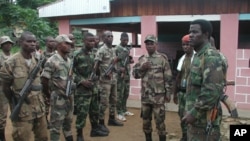Analysts, diplomats and his political opponents say incumbent Ivory Coast President Laurent Gbagbo is using all sorts of methods to stay in power despite growing international pressure and sanctions to force him to leave office after controversial elections last year.
Meetings took place in Mali's capital Bamako Tuesday among West African military chiefs to discuss a possible regional military intervention.
Meanwhile, diplomats in Abidjan said African Union mediator Raila Odinga again failed to convince Mr. Gbagbo to leave office, or even have him meet his challenger, the internationally-recognized winner of the November 28 run-off Alassane Ouattara.
There were a flurry of other meetings to discuss the seven-week crisis including one between the president of the former colonial power France, Nicolas Sarkozy, and Burkina Faso President Blaise Compaore, one of many previous mediators in the Ivorian stalemate.
In an upcoming meeting, West African heads of state are due to meet Saturday in Bamako to discuss effectively blocking the Ivorian account from Mr. Gbagbo's government at the Senegal-based West African regional bank. The block was previously approved, but has not yet been implemented.
While all this talking is taking place, Africa analyst J. Peter Pham says many actors in the international community are finding out more and more about the resilience of Mr. Gbagbo, a former history professor and long-time opposition activist, who had already managed to push back the elections five years amid failed peace deals with northern rebels.
"He has got two things, patience from being an opposition politician, and as an academic, he tends to be very legalistic," he said.
This includes having had the country's constitutional council throw out votes from the rebel-held north, and overturn results that were announced outside legal delays by the national election commission. He has also hired French lawyers to defend his case in international courts.
Financially, Mr. Gbagbo has pushed cocoa businessmen to pay advances on export taxes, as part of efforts to keep paying civil servants and southern security forces, a monthly tab evaluated at up to $100 million.
Mr. Ouattara, who is holed up in a hotel in the main southern city Abidjan, has warned any payments made to Mr. Gbagbo will have to be paid back to his own government.
Ivory Coast also owes money, but Mr. Gbagbo's side says since it is not recognized, it has stopped paying interest payments due on existing government bonds.
Diplomatically, analysts say a chess battle is taking place as well. Mr. Gbagbo's teams of embassy officials in several Western and African capitals are being asked to leave, to be replaced by Ouattara-appointed ambassadors. But analysts say Mr. Gbagbo has pushed back by reinforcing ties with African allies, most notably Zimbabwe and Angola, while also looking for divisions within the West African grouping ECOWAS.
Militarily, Mr. Gbagbo has responded to the threat of outside military action, by saying this could spark a genocide. He has also sent security forces to carry out raids in Ouattara strongholds in an effort to suppress any type of people power movement.
Daniel Chirot, another U.S.-based expert on Ivory Coast, says he does not believe ECOWAS has the logistics to carry out an operation against Mr. Gbagbo. "In order to do that in Cote d'Ivoire, they would need the logistical support of a major outside force which in this case would mean the French and I am not sure that the French at this point would be willing to engage in that," he said.
After his meeting Tuesday with French President Sarkozy, Burkina Faso President Compaore said he did not wish for any military intervention for the time being.
A Nigerian official who was at the meeting as well, Salamatu Suleiman, said she believed a military intervention would be more effective if it was based on the authority of the United Nations.
Mr. Gbagbo has asked both U.N peacekeepers, and an assisting French rapid reaction force, to leave Ivory Coast, a request that has been ignored.
But in a victory for his side, an expected U.N. Security Council vote on Tuesday to send additional peacekeepers to Ivory Coast was postponed over objections from Russia. Analysts and diplomats are pointing out that Russia's oil giant Lukoil is currently exploring for crude in Ivory Coast, and that Russia is another country which could give Mr. Gbagbo much needed financial, strategic and diplomatic backing in the days ahead.




